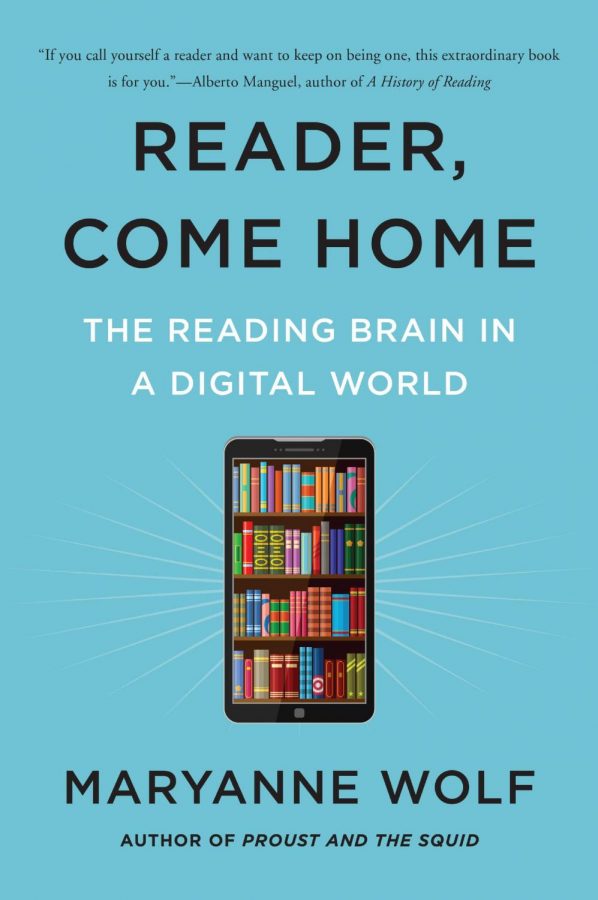Always Judge a Life By Its Reader
You there, reader! Yes, you! I want to share something with you. I recently read a book on reading in the digital era, Reader Come Home by Maryanne Wolf, a scholar of cognitive neuroscience. Despite my reluctance to read this book as part of my summer reading, the strong arguments Wolf presents opened my eyes on how the way I read may be drastically different from the way someone born ten years before me reads. I recommend reading the book, but if you’re like most high schoolers, you’d rather read a SparkNotes version that gives you the highlights of the book. After all, why’s being a good reader important if you can get a summary of the text online? Well, being a good reader facilitates independent thought and empathy. These positive qualities developed when deep reading are qualities that most people today strive for, but their development may be inhibited by our digital culture. It’s time that we put more thought into the negative impacts technology has on the way our generation reads, and therefore on the way we go through life.
Critical thinking skills are an important aspect of a well-rounded person capable of independent thought. Development of critical thinking skills only occurs with a good foundation, which is background knowledge. In her book, Wolf states that the more background knowledge we have, “the more we can draw analogies, and the more we can use these analogies to infer, deduce, analyze, and evaluate our past assumptions.” With more background knowledge, we can distinguish truth from falsehood and reconsider our own ideas as we read others’ ideas. This is vital to independent thought, as it prevents us from falling victim to the attempts at manipulation that we face from sources like politicians or ads. Although the Internet can be useful for gathering background information, it does not develop critical thinking. Consider – when you scroll through social media, do you evaluate the information you see or move quickly to the next post? You are exposed to countless tiny blurbs of information throughout the day. A recent study at the University of California, San Diego revealed that the average person is exposed to approximately 50,000-100,000 words a day through various devices. That’s a lot of reading, but how much information is actually retained and understood? Our ability to deep read on screens is inhibited by the skimming pattern that many of us use when reading on digital devices. This involves skimming for fragments of the text to gain a basic understanding of context, then jumping to the end to read conclusions and (possibly) going back for a few supporting details. This skimming pattern makes us less able to sequence events from what we just read. The easiest solution seems to be to read in print as much as possible. However, if we spend the majority of our time reading on screens, our skimming tendencies carry over to print reading. If you want to become a well-developed independent thinker, it’s time to reconsider your social media habits. Our decreasing ability to perform deep reading, largely due to Internet habits and lack of background knowledge, may be affecting other areas of our lives as well.
Besides providing the foundation for critical thought, deep reading may also increase our capacity for empathy. Reading allows us to step into another ‘s shoes, and more literally than you’d think. A team of Stanford neuroscientists conducted a study on close reading in which they found that regions of the brain which aligned both with what the characters were feeling and doing were activated when close reading. These regions of the brain differed from the regions activated when readers were simply asked to read for entertainment. The cognitive phenomenon that allows us to experience things from another person’s point of view when reading deeply is vital in today’s world, where our diverse societies require tolerance and understanding for peaceful coexistence. Deep reading can help us eliminate prejudices and be more empathetic people. Maryanne Wolf worries that as the ability to deep read declines, intolerance and ignorance will arise, which move us further away from an effective society.
Critical thought and empathy together form wisdom, which is exactly what we need in our rapidly changing world. Maryanne Wolf believes that the ability of good readers to transform information into knowledge and knowledge into wisdom makes them the “antidote to the weaknesses of a digital culture” and “a key to propelling our culture’s greatest potential into the future: wise action.” Where would we be in a world without the wisdom that comes from deep reading? Next time you pick up a book, think about how you are affecting your life simply by how you read.


